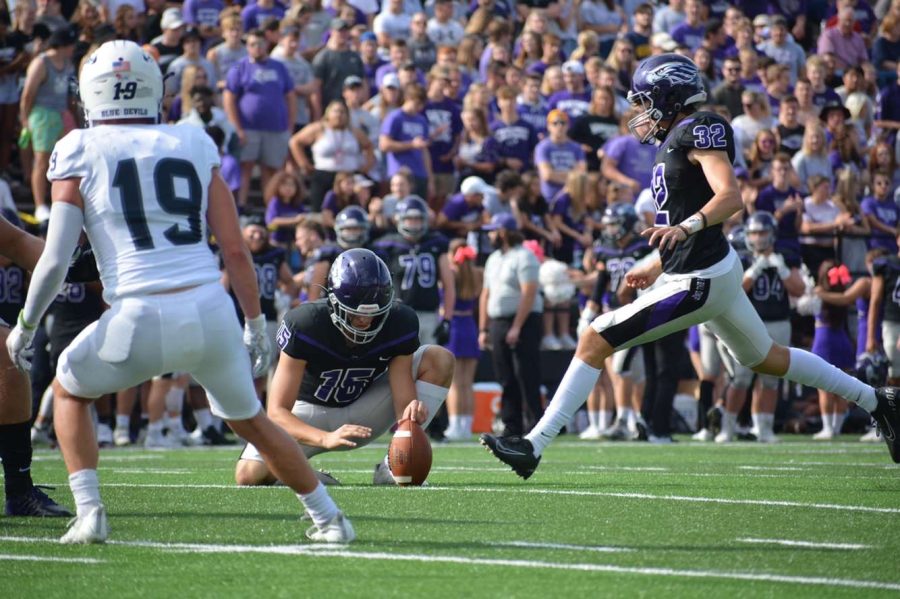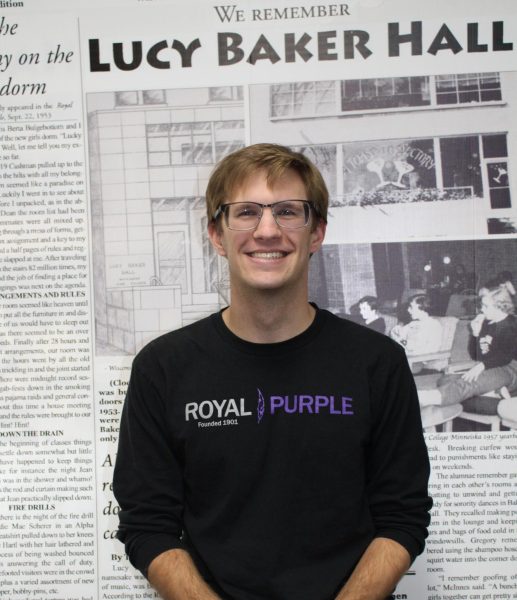Warhawk football wins because of the people
March 13, 2022
In 2005 the UW-Whitewater football team made its first appearance in the Division III National Championship game, now the Warhawks have been to the Stagg Bowl ten times and have garnered six national titles. In pursuit of upholding such a successful program, the coaching staff has spent every offseason working tirelessly to find recruits who will be the next champions.
Finding highly talented players has become increasingly easier for the Warhawk coaching staff over the past two decades thanks to the internet. Now coaches can email high school coaches to find good players and even the players themselves can post their own highlight reels online for college coaches to see. The internet also opens the door for faster and more efficient communication between recruits and coaches.
“Recruiting has evolved so much because of the internet. The ability to be able to go on the internet and find highlights,” said head coach Kevin Bullis. “I can type in the name of a young man from Palatine High School and he’s going to have a highlight film up there already made.”
When looking for what players the coaching staff wants on the team, coaches are able to seek players of their own picking thanks to position coaches getting to recruit for their own position group.
“We recruit by position,” said recruiting coordinator, and newly appointed offensive line coach Tim Shields. “I hand pick the skill sets I want for that position. I get to build a relationship with those kids, and it also helps that I can seek out those kids.”
Despite the individuality that coaches have when it comes to recruiting their own players, all Warhawk coaches look for the same overarching qualities that make a Warhawk a Warhawk.
“Ultimately what you’re looking for is someone who is a willing and excited learner. I know it sounds terribly simplistic but it really is,” said Bullis.
Bullis and his staff look for players who are “ultra motivated” both on the gridiron and in the classroom. Being engaged in the classroom and asking questions is a quality that Bullis wants in his players.
The recruiting process includes three visits, one in the summer, one gameday visit and a final visit early in the calendar year when recruits are about to commit. When players visit Whitewater it is easy to be awe-struck by the fantastic facilities, both in academic buildings such as Hyland Hall and in the football complex which includes facilities that Shields argues are comparable to Division I FCS facilities.
“We are fortunate to have football offices over here, a football locker room and a football field that we do not share with anybody. That is unique for anybody, that’s unique for Division III but Division II and I as well,” Shields said. “When people come here and they enter Lot 24 on campus, they’ve entered a football complex and we are pretty special in that sense.”
Both Bullis and Shields are quick to point out that the facilities, and the six Stagg Bowl trophies along with the 38 conference championships, are not what make Whitewater, Whitewater. Rather it is the people, the trophies and championships are simply a byproduct of the hard work that those people put in every day.
“If you look at what we have here, it’s special, the facilities we have are special but at the end of the day what separates us is not the winning but what goes into the winning,” Shields said. “It’s easy to look at the trophies but what the trophies really symbolize is the hard work and the support we get from everyone around us.”
Bullis gives the recruits advice to the recruits on visits during a speech, advice that he also gave his kids when they were picking colleges to play sports at. Watch the interactions.
“Watch how we interact with you, how we interact with each other, watch how we interact with the others and the family members that are here. That’s the beauty of coming to the football game. I tell them don’t watch the game, watch what we do, what happens when we make a mistake. I want you to watch what happens when our coach interacts with that player, how other players interact with that player,” Bullis said. “Ultimately what I want them to see is our culture. Are we good people, are we going to teach you and treat you right?”
Many of the players that Whitewater recruits are often being recruited by Division II and even Division I FCS schools, a good sign that Warhawk football looks for the best of the best. The Warhawk football coaching staff does not just compete with upper divisions of college football when recruiting, but also with the high quality teams in the WIAC, and northern Illinois.
“It’s tough competition, we are in the heart of Division III football,” Bullis said. “One of the things that really helps us is our location. We are located an hour and fifteen minutes from the suburbs of Chicago, thirty minutes from the suburbs of Milwaukee. The density of population in southeastern Wisconsin and northeast Illinois, that is the best football in those two states.”
“I like to think we have a pretty good success record against the rest of the conference and most of Division III. I would say we win our fair amount and get some Division II and non scholarship players, we like to think we are competitive against some of the FCS schools,” Shields said.
Shields said that recruiting is an extension of the season and that the rivalries continue as teams compete against each other for some of the best talent in the area. Sometimes the coaches are working just as hard to get recruits as they are when they prepare for a game.
Of course, Whitewater doesn’t get every player that they recruit. However as transferring grows to be a larger part of college football, building relationships with recruits is increasingly important. Sometimes when a recruit commits to a Division I or II school and then decides to transfer, Whitewater is on the list of places to transfer because of the strong relationships that coaches built with them during the recruiting process.
Players are not the only ones being recruited to Warhawk football. This off season, the team has seen three coaches depart for other jobs. Peter Jennings, the former offensive coordinator, was announced as the head coach of UW-Oshkosh on March 1. Bullis emphasized the importance of having good coaches, as well as his role in helping the coaches on his staff make the moves up in the coaching world.
“It’s not just recruitment of student athletes, yes that is the most important, but it is also the recruitment of coaches. Getting talented teachers here, to get those talented human beings. There is no doubt that it is a huge piece,” Bullis said. “It’s exciting when you recruit talented people to come here and coach and be here and when they get that big promotion that’s cool. I’m excited for coach Jennings and coach Allen and coach Mcclin. It’s my job to help them do that, it is my responsibility to them to help them get that big promotion. They got it, it’s beautiful.”
The success of Warhawk football is largely thanks to the incredible coaching and student athletes that have gone through the program for nearly twenty years. Trophies, championships and fantastic facilities are the results of the hard work and dedication that coaches, players and even more people put in day in and day out. Bullis said it best, what makes Whitewater is the people.














